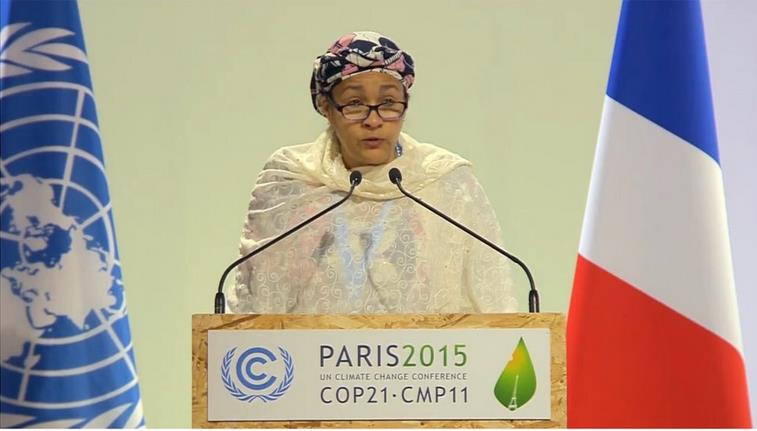Nigeria’s Environment Minister, Mrs Amina J. Mohammed, on Tuesday (December 8, 2015) at a High Level Segment of the ongoing UN Climate Change Conference (COP21) in Paris said that the nation is committed to an economic transformation, which places inclusive green growth at its heart. Mohammed, who is head of the country’s delegation at the COP, emphasised that the transformation is reflected in the recently submitted Intended Nationally Determined Contribution (INDC)

The political momentum generated by the recent universal adoption of the 2030 Agenda on Sustainable Development by the United Nations General Assembly in New York provides the appropriate context for engagement at this Conference of Parties. The Paris outcome must result in a legally binding Agreement that ensures a sustainable future for our people and planet.
Nigeria is committed to an economic transformation, which places inclusive green growth at its heart. This transformation is reflected in my country’s ambitious INDC. We have announced our plans to reduce emissions by 20% below BAU by 2030, rising to 45% with the support of the international community. These are actions we can and are determined to take to support our common interest in addressing the global climate challenge. Our renewed urgency comes from recognition of the grave social, economic and environmental threats that climate change poses to our country. Climate change impacts are already threatening the livelihoods of our people. The devastating floods the country suffered in 2012 displaced more than 2.1 million Nigerians are a stark reminder of our vulnerability.
Furthermore, we are acutely aware of how climate variability can aggravate social unrest and provide a breeding ground for conflict and mass migration. For example, Lake Chad in the North East of our country is today a mere 10% of its original size, having shrunk from 25,000 sq. km to barely 2,500 sq. km in 25 years and livelihoods have been lost thus exacerbating poverty.
Nigeria fully aligns itself with the principles of climate justice to achieve a human-centred approach towards safeguarding the rights of the most vulnerable and lifting the burdens and sharing the benefits of climate action. Women, children and youth must be integrated throughout this Agreement. Recognising women empowerment and rights will be key to success here in Paris. We must also recognise that sustainable transformations will be needed to protect human health and welfare for our populations.
Nigerians have high expectations of this Conference. Paris must give us an agreement that will equitably promote climate change mitigation, adaptation and resilience based on effective means of implementation through adequate financing, technology transfer and capacity development. Developed countries have a further responsibility of taking the lead in emission reductions, and also to fulfil obligations to provide finance, technology and capacity to developing countries in support of their own mitigation and adaptation obligations. It is our fervent hope that these implementation modalities will be explicitly enshrined in the Agreement.
But even though the current focus of INDCs is on the delivery of emissions reductions to 2030, we must not take our eyes off the longer-term goal – and the emissions pathway that this demands. Ultimately, there is a moral imperative to stabilise temperature increases at 1.5 degrees Celsius. The African Union Agenda 2063 shows how Africa is committed to contributing and delivering on this goal.
The onus is now on us, as political leaders, to seize this historic opportunity to deliver an ambitious Agreement. It is an opportunity that will define the physical and economic security of our children and their children. Nigeria has shown its willingness to be part of the solution.
I will end with a wise quote from Madiba that says “It always seems impossible until it is done”.
